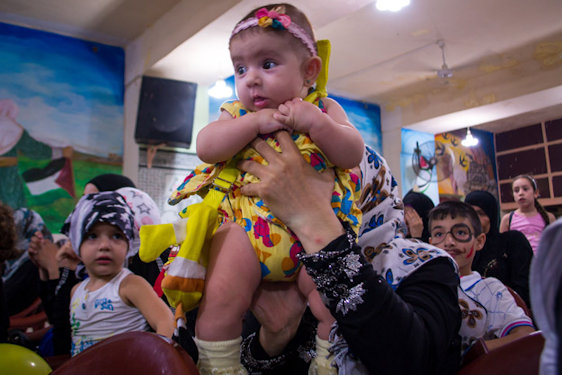A challenge and a blessing
Wenner calls the situation both a challenge and a blessing. Churches in Germany, she added, are worried about the deaths of those trying to make their way to Europe and the increasing number of xenophobic acts against refugees.
“The right of refugees to seek asylum is one of the human rights that we — especially we in Germany — have to protect,” she wrote in an email to United Methodist News Service.
“Germany is complaining because of the weakness of other European countries to take care a fair percentage of refugees. Together with many other people, I am convinced that we are able to respond to the challenges, and I am referring to our history where we managed to integrate for more refugees and newcomers than today.”
Messstetten is only one example of how United Methodists in Germany are responding to newcomers “in a very open and caring way,” the bishop said.
The gift in return? “It is a blessing for many of the congregations that migrants — amongst them a big number of asylum seekers and refugees — come to the worship services,” Wenner noted.
Church’s stance on global migration
The United Methodist Social Principles affirm that, “In order to provide basic needs such as food, clothing, shelter, education, health care, and other necessities, ways must be found to share more equitably the resources of the world.”
If their own countries do not ─ or cannot ─ meet those needs, people will move elsewhere. “That many people will resist poverty and war through migration is an ancient and modern fact of human existence,” a resolution on global migration in the 2012 United Methodist Book of Resolutions points out.
Sometimes, the consequences are deadly.
The Rev. Lothar Pöll, United Methodist superintendent of the Austria Provisional Conference issued a statement labeling the deaths of migrants, including the discovery of 71 dead refugees in a truck on an Austrian highway, as shocking. He called upon Austria to make war refugees welcome and treat them humanely.
Urs Schweizer, assistant to Bishop Patrick Streiff, United Methodist Church of Central and Southern Europe, also reported possible new assistance in Macedonia.
“The United Methodists in Macedonia have, on a very limited scale, provided refugees with bottled water and clothes in the past, and they are currently exploring ways to help those people longing for a better future,” Schweizer said.
In Hungary, United Methodists are uncertain how to help migrants in their quest to get to Germany and western Europe and are praying that European leaders find an acceptable solution.
UMCOR at work
In Sicily, where many migrants have arrived to gain entrance to Italy, the United Methodist Committee on Relief has paired with a local partner, Pellegrino della Terra, to provide emergency food vouchers for the new arrivals.
The Rev. Jack Amick, head of UMCOR’s international disaster response program, said the agency is continuing to look “at the more urgent needs” as refugees and migrants flow through Europe.
Just recently, UMCOR gave a $50,000 grant to GlobalMedic to provide food packets and hygiene kits for 750 families who arrived on the islands of Kos and Lesbos in Greece, he reported.
The Waldensian and Methodist Churches in Italy have provided funds for a migrant project of the Federation of Protestant Churches in Italy called “Mediterranean Hope.”
Michigan prepares
Director of Justice for our Neighbors Southeastern Michigan (JFON-SEMI), Tori Booker, reports: “Currently, our attorney is representing a family from Syria with their political asylum application and is ready to serve others. We are also prepared to help Syrian families apply for Temporary Protected Status now that Congress has authorized this form of relief.” Apart from providing free legal services, JFON also operates “in a climate of intentional hospitality through our clinics, which are hosted by United Methodist churches. Tori remarks, “Clients who are nervous or frightened arrive at our clinics and are greeted with friendly faces, snacks and an attitude of welcome.”
Laura Rampersad, JFON West Michigan’s Director, adds: “As far as immediate response to Syrian crisis there will be a need for church placements for new arrivals. Congregations should consider answering the call if Congress increases refugees allowed into U.S.” She lists “housing, employment and school as immediate needs of families navigating immigration issues.” JFON West Michigan has strong ties to the two major regional refugee resettlement agencies in Bethany Christian Services and Lutheran Social Services.
Chris Cavanaugh, Program Manager of Refugee Services for Lutheran Social Services of Michigan, says, “We have been gearing up statewide for a resettlement program for Syrians, meeting with local Syrian-Americans, Syrian professionals, and the Islamic Center. We have resettled a few cases here in Grand Rapids and almost 60 Syrians in Detroit.”
Cavanaugh believes there is strong precedent for increased mobilization: “After the Vietnam War the U.S. was able to be very responsive and resettled over 200,000 ‘boat people.’ There is much similarity to what we are seeing in Europe,” he notes. He encourages interested individuals to consider sponsorship, describing the refugees’ situation this way: “Syrians have experienced high trauma and they need mental health support. They have a strong willingness to be contributing members of the community with eagerness to work and integrate.” Churches are uniquely positioned to facilitate integration. “The best way to help them integrate is just to get to know them and help them out with everyday things we take for granted,” Cavanaugh concludes.
~Michigan Area News Editor Kay DeMoss contributed to this report
Last Updated on February 6, 2024

